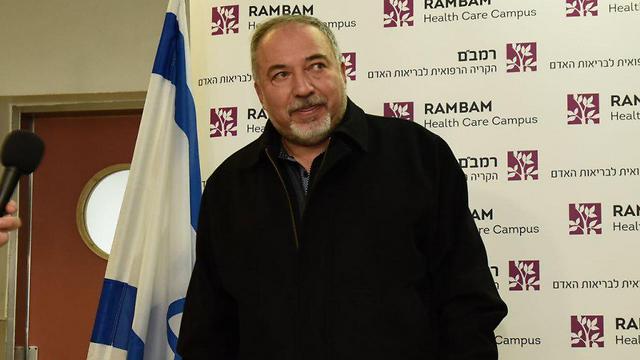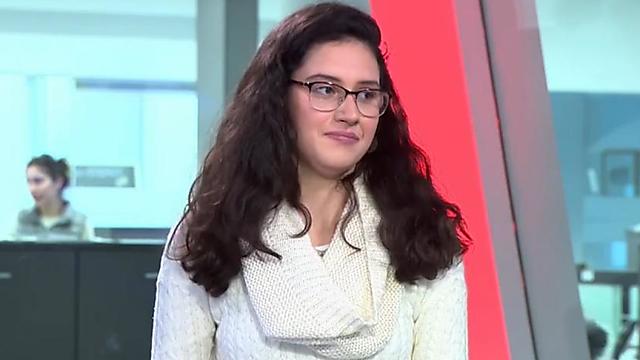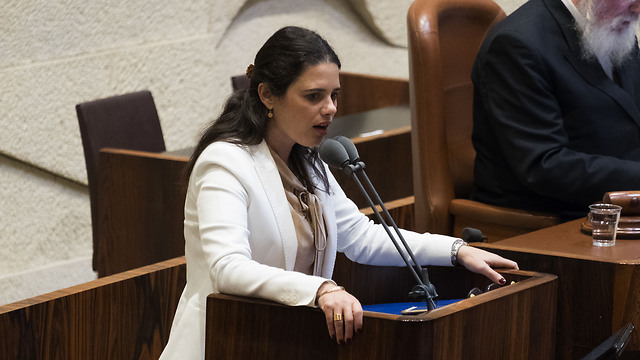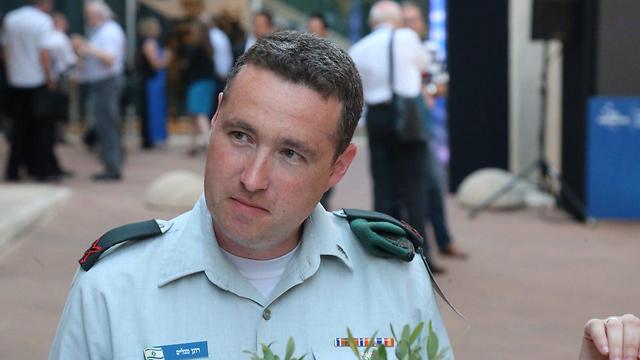

Youths petition for, against anti-integration rabbi
Religious-Zionist call to support rabbi of Safed Shmuel Eliyahu's right to voice his opinion against co-ed service, while Reform Jews call for his indictment; the IDF, meanwhile, says no correlation between motivation for enlistment and women's integration into the army.
Some 2,000 Jews from the religious-Zionist sector signed a petition last week supporting Chief Rabbi of Safed and member of the Chief Rabbinate Council, Shmuel Eliyahu, who was barred from attending IDF events for calling on IDF Chief of Staff Gadi Eisenkot to resign over his push to integrate women into more roles in the army, including combat ones.
In the wake of his ban by Defense Minister Avigdor Lieberman, the petitioners urged Eliyahu to continue to express his opinion "without any fear or trepidation" and emphasized that while the army was "important" to them, the Torah and Jewish law are even more so."

"We strongly protest the harm done to the rabbi's honor in recent days," the petition said.
"We also want to support (Eliyahu) in the face of the attacks by various media outlets and politicians who are trying to determine for him what the rabbi is permitted to say and what is forbidden.
"We know that the words that the rabbi says stem from a clear understanding of Halacha, and they are not things that are said without thought."
The petition was initiated by several of Rabbi Eliyahu's followers, and most of the signatories were high school seniors, yeshiva students and members of the religious Zionist youth movements.
Among them were hundreds of candidate for IDF recruitment and even soldiers from Hesder yeshivas, some of whom are in active service.
"You are shooting at you own forces," said one of the signatories, Daniel Brautelitz, trying to explain their position. "You got the IDF in your hands, you got the most amazing army in the world, take responsibility for what is happening. Stop fighting the rabbis. They are not the enemy."
'Defend the legitimacy of our service—indict the rabbi'
Meanwhile, several dozen high school girls sent a petition Tuesday to Justice Minister Ayelet Shaked, asking her to exercise her authority and prosecute Eliyahu.The girls, some of them high school seniors and some of them studying in pre-military preparatory courses throughout the country, sent the letter via the Israel Movement for Reform & Progressive Judaism (IMPJ) ahead of a hearing at the High Court of Justice on a petition filed with other organizations against the rabbi over comments he made on issues such as women's service in the IDF, the Arab sector, the LGBT community and the legal system.
"We were surprised and disappointed to discover that you allow public servants to use their status to act against the legitimacy of women's service in the IDF and against equality for women in general," the girls wrote in their petition.
"In his official position, Rabbi Eliyahu stated that 'women's service does more harm than good,' and that 'the integration of women into the army greatly decreases the motivation to serve,'" they noted. "He called for a mass revolt of soldiers … and used his role as city rabbi to prevent the recruitment of women to the IDF."
The signatories urged Shaked to "defend equality and the legitimacy of (their) service," saying that even though they are "happy and proud to serve (their) country and even endanger (their) lives," her refusal to use her authority and take action against Eliyahu "gives him a license … to continue his inappropriate activity and incite against women serving in the IDF."
"We call upon you to change your position, to protect the female soldiers in the IDF, and to put Rabbi Shmuel Eliyahu on disciplinary trial," they concluded.
Maya Lender, a student in the pre-military preparatory program of The Jewish Movement for Social Change, suffers from physical disabilities but has chosen to enlist in the army even though she is not obligated to do so.
In an interview with Ynet, Lender explained her opposition to the rabbi, who according to her "represents the public who pays him hundreds of thousands of shekels a year," arguing it is "not legitimate" for him to not be held accountable for his remarks.
"Who is he to deprive us of the right (to serve our country—ed) and say that women harm military service?" she slammed.
'One cannot protest silencing, yet muzzle rabbis'
At a hearing in the High Court of Justice Tuesday, the judges gave Shaked 60 days to formulate her decision regarding the indictment of Rabbi Eliyahu.Attorney Orly Erez-Lachovsky, the director of the legal department of IMPJ, who represented the petitioners, said that "the judges expressed surprise at the fact the justice minister did not formally decide on the matter."
She then expressed her hope the High Court will "make it clear to the justice minister that Rabbi Eliyahu's harsh statements are have crossed a red line and justify a disciplinary trial."
The Justice Ministry said in response that "a telephone conversation was held between the Minister of Justice and Rabbi Shmuel Eliyahu, during which she explained to him that the a city rabbi must operate under certain restrictions that apply to public servants, including restrictions on freedom of expression.
"The minister stressed that as much as the rabbi wishes to express ideas in public, he must do so with sensitivity and respect for all the different sectors."
Rabbi Eliyahu's office criticized the attempt to silence him, saying that one "cannot protest the silencing of Yehonatan Geffen and at the same time muzzle rabbis."
Claims of decreased motivation 'baseless'
IDF Spokesperson Brig. Gen. Ronen Manelis said Wednesday that "any attempt to link the Joint Service Ordinance (to integrate women into the IDF) to (a drop in) motivation is baseless."
Manelis, responding to Eliyahu's disparaging remarks, said "not only is there no motivation problem, but there is too much motivation."
"In places where there is a problem with motivation, which stems from many other reasons, there is no 'problem' with co-ed service," the IDF spokesman said, rebuking Eliyahu for his acrimonious remarks on the IDF in general and its chief of staff in particular.
"A person who holds public office and whose words carry weight must show responsibility (when he speaks)," he said. "He should refrain from issuing unnecessary statements that I think should not have been said, especially not to someone who has devoted 40 years of his life to the army and does so day and night."
The IDF Spokesperson also commented on a meeting that was supposed to take place between IDF Chief Military Rabbi, Brig. Gen. Eyal Karim, and Sephardi Chief Rabbi Yitzhak Yosef, saying it was canceled due to technical reasons and not because of the defense minister's instructions.
"It has already been rescheduled and will take place in the coming days," he said, clarifying that while there was "no such directive from the chief of staff or the defense minister," the IDF is still subject to the political echelon and "if there is such a directive, the IDF will comply with it."
Kobi Nachshoni, Amir Alon and Yoav Zitun contributed to this story.



















